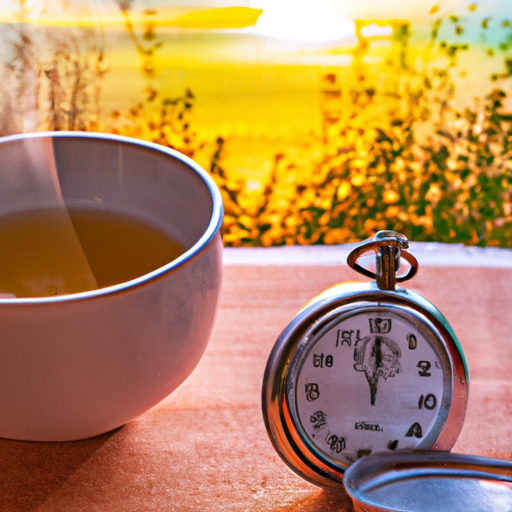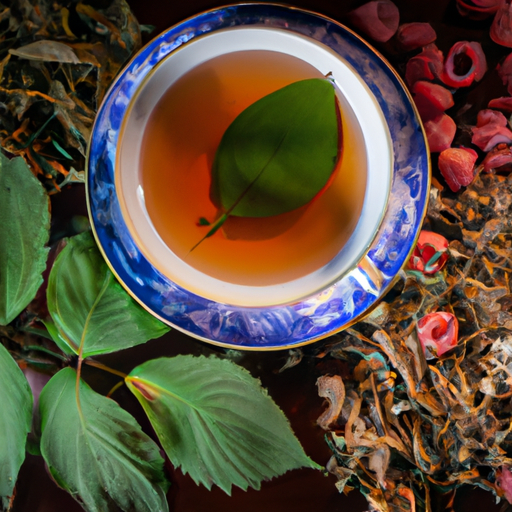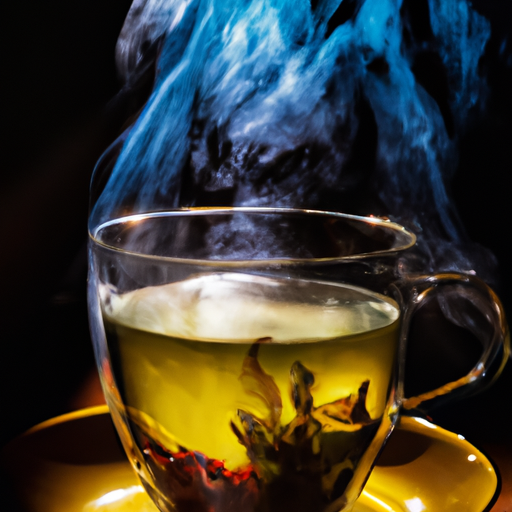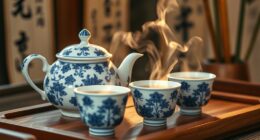Imagine this scenario: It’s early in the morning, and the sun is beginning to shine through your curtains. You’re eager to begin your day, but you’re also following an intermittent fasting regimen. While enjoying a cozy mug of herbal tea, you might be questioning: Is it okay to consume this during intermittent fasting?
As a registered dietitian, I’m here to provide you with evidence-based information on this matter. Intermittent fasting has gained popularity for its potential health benefits, including weight loss and improved metabolic health. Herbal tea, on the other hand, has been praised for its numerous health benefits, from soothing digestion to reducing inflammation. But can these two practices coexist?
In this article, we will explore the impact of herbal tea on intermittent fasting, discussing its potential benefits or drawbacks. I will provide you with practical tips and alternatives to help you make informed decisions about incorporating herbal tea into your intermittent fasting routine.
So, let’s dive in and find the perfect balance between herbal tea and intermittent fasting.
Key Takeaways
- Herbal tea can be incorporated into intermittent fasting for weight loss and digestion benefits.
- Herbal teas are low in calories and reduce hunger, promoting satiety.
- Peppermint tea regulates insulin levels and maintains stable blood sugar during fasting.
- Herbal tea provides hydration without calories or added sugars, offering a soothing and comforting experience during fasting.
Understanding Intermittent Fasting
Intermittent fasting, or IF, is a popular eating pattern that involves cycling between periods of fasting and eating. There are different methods of intermittent fasting, such as the 16/8 method, where you fast for 16 hours and eat during an 8-hour window. Other methods include alternate-day fasting and the 5:2 diet.
Many people turn to intermittent fasting for its potential health benefits. Research suggests that intermittent fasting may help with weight loss, improve insulin sensitivity, and reduce inflammation in the body. It may also have positive effects on brain health and longevity. However, it’s important to note that the research on intermittent fasting is still evolving, and more studies are needed to fully understand its long-term effects.
Now, let’s explore the benefits of herbal tea during intermittent fasting.
Exploring Herbal Tea Benefits
Exploring the benefits of herbal tea, one can experience a soothing and rejuvenating effect on the body while fasting. Herbal tea, made from a variety of plant leaves, flowers, and roots, is known for its plethora of health benefits.
When it comes to weight loss, herbal tea can be a valuable tool. Some studies suggest that certain herbal teas, such as green tea and oolong tea, may help boost metabolism and increase fat burning. Additionally, herbal tea can aid in digestion by reducing bloating and promoting bowel movements. Ingredients like peppermint and ginger have been shown to have a calming effect on the digestive system, relieving symptoms of indigestion and improving overall gut health.
However, it’s important to note that herbal tea alone isn’t a magic solution for weight loss or digestion issues. It should be combined with a balanced diet and regular exercise to achieve optimal results. Furthermore, herbal tea should be consumed without any added sweeteners or milk, as they can add unnecessary calories and hinder the fasting process.
Incorporating herbal tea into an intermittent fasting routine can have potential benefits for weight loss and digestion. It is essential to choose the right herbal teas and consume them in their pure form to maximize their effects. However, it’s always advisable to consult a healthcare professional or registered dietitian for personalized advice and guidance.
With this in mind, let’s delve into the impact of herbal tea on fasting.
The Impact of Herbal Tea on Fasting
When considering the impact of herbal tea on fasting, two key points to consider are its potential calorie intake and effects on insulin levels.
Herbal teas are typically low in calories, making them a great option for those practicing intermittent fasting who are looking to minimize their calorie intake during fasting periods.
Additionally, studies have shown that certain herbal teas, such as green tea, may have a positive effect on insulin levels, potentially aiding in blood sugar control.
It’s important to note, however, that individual responses may vary and more research is needed in this area.
Potential Calorie Intake
Sipping on a cup of soothing herbal tea during your fasting period is like a gentle breeze that whispers nourishment without tipping the calorie scale. Herbal teas, such as chamomile, peppermint, and green tea, are great alternatives to regular tea or coffee when fasting. These herbal infusions offer a range of flavors and potential health benefits, including appetite suppression.
Research suggests that certain herbal teas can help reduce hunger and promote satiety, making it easier to stick to your fasting routine. For example, peppermint tea has been found to decrease appetite and cravings. Green tea contains compounds, like catechins, which have been shown to enhance fat oxidation and boost metabolism.
So, if you’re looking for a hydrating and calorie-free option to sip on during your fasting period, herbal tea can be a great choice. Now, let’s explore the effects of herbal tea on insulin levels.
Effects on Insulin Levels
Peppermint tea can help regulate insulin levels, aiding in maintaining stable blood sugar levels during your fasting period. This is important because when you’re fasting, your body relies on stored glucose for energy.
When you consume herbal tea, such as peppermint tea, it can potentially affect your insulin response and blood sugar levels. Studies have shown that certain compounds found in peppermint tea, like polyphenols, may have a positive impact on insulin sensitivity and glucose metabolism. This can help prevent drastic spikes or drops in blood sugar levels, which can be beneficial during intermittent fasting.
However, it’s important to note that the effects of herbal tea on insulin levels may vary among individuals, and more research is needed to fully understand its impact.
In the next section, we will explore different herbal tea options for intermittent fasting.
Herbal Tea Options for Intermittent Fasting
Indulge in the soothing embrace of herbal tea while intermittent fasting, and let your taste buds dance with a variety of invigorating options. Herbal tea is a great choice for those practicing intermittent fasting, as it is typically low in calories and can help keep you hydrated during fasting periods. When it comes to herbal tea options, there are plenty to choose from, each with its own unique flavors and potential health benefits.
To provide a comprehensive overview of herbal tea options for intermittent fasting, I have created a table below:
| Herbal Tea Option | Flavor Profile | Potential Health Benefits |
|---|---|---|
| Chamomile | Floral | Promotes relaxation and sleep |
| Peppermint | Minty | Aids digestion and relieves bloating |
| Ginger | Spicy | Reduces inflammation and soothes nausea |
| Green Tea | Earthy | Boosts metabolism and aids weight loss |
It’s important to note that while herbal teas are generally low in calories, some flavored teas or blends may contain added sugars or artificial sweeteners, which can increase calorie intake. To avoid this, opt for pure herbal teas or check the labels for any added ingredients.
Now that you know about the herbal tea options, let’s move on to the next section where we will explore some delicious herbal tea recipes for fasting periods.
Herbal Tea Recipes for Fasting Periods
Get ready to tantalize your taste buds with these delectable herbal tea recipes that are perfect for your fasting periods. Herbal tea is a great option to incorporate into your intermittent fasting routine, as it provides numerous benefits to support your overall health and well-being. Here’s why herbal tea is a fantastic choice during fasting periods:
-
Hydration: Herbal tea is a delicious way to stay hydrated during your fasting periods, as it doesn’t contain any calories and is free from added sugars or artificial sweeteners.
-
Antioxidants: Many herbal teas are rich in antioxidants, which help protect your cells from damage caused by harmful free radicals.
-
Digestive Aid: Certain herbal teas, like ginger or peppermint, can help soothe your digestive system and alleviate any discomfort you may experience during fasting.
-
Stress Relief: Herbal teas like chamomile or lavender have calming properties that can help reduce stress and promote relaxation, making them an excellent choice for your fasting periods.
Incorporating herbal tea into your intermittent fasting routine can offer a range of benefits. However, it’s essential to choose herbal teas that don’t contain any added sugars or artificial ingredients.
In the next section, we’ll discuss some tips for incorporating herbal tea into your intermittent fasting routine seamlessly.
Tips for Incorporating Herbal Tea into Intermittent Fasting
For a seamless incorporation of herbal tea into your intermittent fasting routine, try these helpful tips. Herbal tea can be a great addition to your fasting periods as it’s typically low in calories and can provide a soothing and comforting experience. However, it’s important to be mindful of the potential calorie intake when incorporating herbal tea into your fasting schedule.
One important tip is to opt for herbal teas that are free from added sugars or artificial sweeteners. These additives can increase the calorie content and may disrupt your fasting state. Instead, choose herbal teas that are naturally caffeine-free and have a mild flavor, such as chamomile or peppermint.
Another tip is to consume herbal tea during your fasting window, as it can help to curb hunger and cravings. Sipping on a warm cup of herbal tea can provide a sense of satiety and satisfaction, making it easier to stick to your fasting plan.
It’s also important to note that herbal tea shouldn’t be used as a substitute for water during fasting periods. Staying hydrated is essential for overall health and wellbeing, so be sure to drink plenty of water alongside your herbal tea.
Finding a balance with herbal tea and intermittent fasting is key. By incorporating herbal tea into your fasting routine, you can enjoy its potential benefits while still maintaining the principles of intermittent fasting.
Conclusion: Finding a Balance with Herbal Tea and Intermittent Fasting
Incorporating herbal tea into your intermittent fasting routine can be a great way to add flavor and variety to your fasting periods. As a registered dietitian, I understand the importance of finding a balance between enjoying herbal tea and reaping the health benefits of intermittent fasting.
Here are three key points to consider when incorporating herbal tea into your fasting routine:
-
Hydration: Herbal teas are a hydrating beverage option that can help you stay hydrated during your fasting periods. Staying properly hydrated is essential for overall health and can aid in digestion and detoxification processes.
-
Calorie content: While herbal teas are generally low in calories, it’s important to check the label or research the specific tea you plan to consume. Some herbal teas may contain added sugars or other ingredients that can break your fast. Opt for herbal teas that are free from additives and sweeteners to ensure you’re sticking to your fasting goals.
-
Potential benefits: Herbal teas have been associated with various health benefits, such as improved digestion, reduced inflammation, and increased antioxidant intake. Incorporating herbal teas into your fasting routine can provide an extra boost of nutrients and support overall well-being.
Finding a balance with herbal tea and intermittent fasting is key. By choosing herbal teas that align with your fasting goals and being mindful of their calorie content, you can enjoy the health benefits without compromising your fasting efforts. Remember to consult with a healthcare professional or registered dietitian to personalize your intermittent fasting plan and ensure it aligns with your specific needs and goals.
Frequently Asked Questions
Can I sweeten my herbal tea while intermittent fasting?
Yes, you can sweeten your herbal tea while intermittent fasting. However, it’s important to be mindful of the type and amount of sweetener used, as it may affect blood sugar levels and potentially cause digestive issues.
Are there any herbal teas that can break my fast?
Some herbal teas, such as green tea and black tea, can be consumed during intermittent fasting without breaking the fast. These teas offer potential health benefits and can be a good choice for those practicing intermittent fasting.
Can herbal tea help with hunger cravings during fasting periods?
Herbal tea can be a helpful tool for managing hunger cravings during fasting periods. It has various benefits, including promoting weight loss and reducing appetite. However, it’s important to choose herbal teas without added sugars or calories to avoid breaking your fast.
Can I drink herbal tea with caffeine while intermittent fasting?
Drinking herbal tea with caffeine while intermittent fasting may have effects on the body. Caffeine can potentially disrupt fasting benefits such as autophagy and insulin sensitivity. It’s best to opt for caffeine-free herbal teas during fasting periods.
Can herbal tea interfere with the benefits of intermittent fasting?
Herbal tea does not significantly affect blood sugar levels or metabolism during intermittent fasting. It can be consumed without interfering with the benefits of fasting. However, it’s important to choose caffeine-free herbal teas to avoid any potential disruptions.
Conclusion
In conclusion, incorporating herbal tea into your intermittent fasting routine can be a beneficial and enjoyable addition. Research suggests that herbal tea can support hydration, provide antioxidants, and promote relaxation during fasting periods.
While it’s important to choose herbal teas without added sugars or calories, there are plenty of options available that can complement your fasting goals. Remember, finding a balance is key, and listening to your body’s needs is essential.
So go ahead, sip on a soothing cup of herbal tea and experience the refreshing benefits it can bring to your intermittent fasting journey. It’s like a hug for your taste buds.










